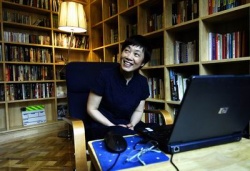“Cui Weiping”的版本间的差异
来自China Digital Space
(Created page with "<h3>崔卫平</h3> File:Cui-weiping.jpeg|250px|thumb|right|''Cui Weiping. (Source: [http://ent.ifeng.com/movie/special/bergman/about/detail_2012_07/27/16352797_0.shtml...") |
|||
| 第3行: | 第3行: | ||
[[File:Cui-weiping.jpeg|250px|thumb|right|''Cui Weiping. (Source: [http://ent.ifeng.com/movie/special/bergman/about/detail_2012_07/27/16352797_0.shtml ifeng.com])]] | [[File:Cui-weiping.jpeg|250px|thumb|right|''Cui Weiping. (Source: [http://ent.ifeng.com/movie/special/bergman/about/detail_2012_07/27/16352797_0.shtml ifeng.com])]] | ||
| − | Cui Weiping believes that public intellectuals must speak about the past and | + | Cui Weiping believes that public intellectuals must speak about the wrongs of the past and present. She is professor emerita of the Beijing Film Academy, a cheerleader for the [http://chinadigitaltimes.net/2009/03/cui-weiping-%e5%b4%94%e5%8d%ab%e5%b9%b3-i-am-a-grass-mud-horse/ grass-mud horse], and one of the signatories to Charter 08, a manifesto of democracy that cost author [[empty chair|Liu Xiaobo]] his freedom. |
Born in Jiangsu Province in 1956, Cui grew up in the "[http://www.wordswithoutborders.org/article/awakening-the-individual-consciousness muddled and obscure intellectual tradition—part Confucian and part Communist]"—of the Cultural Revolution. She was among the first to attend university after that chaotic period finally came to an end. Cui studied literature at Nanjing University, from which she graduated with a master's degree in 1984. She then went to teach at the Beijing Film Academy, where she remained until she was [http://kuow.org/post/china-ceaseless-quest-silence-dissent forced to retire] after co-authoring a letter in support of the Tiananmen Mothers. | Born in Jiangsu Province in 1956, Cui grew up in the "[http://www.wordswithoutborders.org/article/awakening-the-individual-consciousness muddled and obscure intellectual tradition—part Confucian and part Communist]"—of the Cultural Revolution. She was among the first to attend university after that chaotic period finally came to an end. Cui studied literature at Nanjing University, from which she graduated with a master's degree in 1984. She then went to teach at the Beijing Film Academy, where she remained until she was [http://kuow.org/post/china-ceaseless-quest-silence-dissent forced to retire] after co-authoring a letter in support of the Tiananmen Mothers. | ||
2017年2月8日 (三) 02:26的版本
崔卫平

Cui Weiping believes that public intellectuals must speak about the wrongs of the past and present. She is professor emerita of the Beijing Film Academy, a cheerleader for the grass-mud horse, and one of the signatories to Charter 08, a manifesto of democracy that cost author Liu Xiaobo his freedom.
Born in Jiangsu Province in 1956, Cui grew up in the "muddled and obscure intellectual tradition—part Confucian and part Communist"—of the Cultural Revolution. She was among the first to attend university after that chaotic period finally came to an end. Cui studied literature at Nanjing University, from which she graduated with a master's degree in 1984. She then went to teach at the Beijing Film Academy, where she remained until she was forced to retire after co-authoring a letter in support of the Tiananmen Mothers.
Cui is part of the once-close circle of Beijing liberal intellectuals that includes Liu Xiaobo and Hu Jia. She and Xu Youyu collected the Homo Homini Award for Charter 08 in Liu's stead. One year after Charter 08 was first circulated, Cui collected comments on Liu Xiaobo’s imprisonment from a range of Chinese public intellectuals. Criticized for exposing them to punishment for speaking on a taboo subject, Cui defended her decision to publish the comments.
Cui has translated works by Czech dissidents Václav Havel and Ivan Klima. Her translations cannot be published in China, but have appeared on Taiwanese bookshelves.
Cui Weiping at CDT
<feed url="feed://chinadigitaltimes.net/china/cui-weiping/feed/" entries="5">
- [{PERMALINK} {TITLE}] {DATE}, by {AUTHOR}
</feed>




